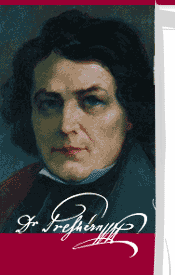| |
|
|
| |
Some of Prešeren's Contemporaries |
|
| |
|
|
 |
Janez
Bleiweis (1808-1881), the Slovene politician and national
leader, the publisher of Kmetijske in rokodelske novice
(Farmers' and Crafts News). History describes him as a
controversial person, who would rapidly alter his convictions
and principles. His attitude to Prešeren was ambivalent
too, even though he cannot be denied the credit for putting
Prešeren on the literary and wider cultural map of Slovenia.
He advocated the erection of a monument to Prešeren in
Kranj. During the last years of the poet's life, Bleiweis
tried to give Prešeren a firmer place in public life;
he ensured the publication of some of the poems, which
lifted the spirits of the exhausted poet. |
|
| |
|
|
 |
Blaž Crobath
(1799-1848), a lawyer for whom Prešeren worked in
the period between 1834 and 1846. They were already friends
whilst students in Vienna. As an employer, Crobath showed
great understanding for Prešeren and writers in general.
He was considered a supporter of the nascent national
movement. His youngest daughter, Luiza Pesjak, later became
a poetess. |
|
| |
|
|
 |
František
L. Čelakovsky (1799-1852), a Czech poet and collector
of folk poetry. Čelakovsky was enthusiastic about Prešeren's
poems, and told him so in their correspondence. Čop published
Čelakovsky's views, and this recognition meant a lot to
the self-conscious Prešeren. Prešeren and Čelakovsky kept
corresponding right up to the end. Čelakovsky also corresponded
with other literary kindred spirits in Slovenia. |
|
| |
|
|
 |
Matija Čop
(1797-1835), Prešeren's friend and literary mentor.
At the time, he was one of the most learned Slovenes.
He worked abroad, later became a secondary school teacher
and finally worked as a librarian in Ljubljana. He spoke
nineteen languages and was familiar with all the contemporary
world poetry. He assisted Prešeren by advising him and
reviewing his work, and they fought on the same side in
the battle over the alphabet. With his good reputation
in Vienna, he helped to overcome many obstacles in the
publication of Kranjska Čbelica (The Carniolan Bee). Čop
led a rather ascetic bachelor's life. |
|
| |
|
|
 |
Zalika
Dolenc (1804-1882), the daughter of an innkeeper.
Prešeren began to frequent Dolenc's inn on the outskirts
of Ljubljana during his student years. And when he returned
to Ljubljana with a degree under his belt, he was seriously
interested in Zalika. She, however, rejected him. The
echo of this unrequited love can be found in his ballad
Povodni mož (The Water Man). When the poem was first published,
Prešeren wrote about Zalika, and only later, in the amended
version to be published in the collection Poezije (Poems),
did he change Zalika into Urška. The poem Dekletom (To
Girls) was also written with the "proud" Zalika in mind. |
|
| |
|
|
 |
Ana Jelovšek
(1823-1875), Prešeren's mistress, the mother of his
three illegitimate children. She was born into a poor
family, her godmother was Julija Primic's mother. She
was considered to be a beautiful, but an impetuous girl,
who drew the admiration of many men. Prešeren met her
at Blaž Crobath's and began to have romantic feelings
towards her. After she gave birth to their first child,
she had it fostered; this created an unbridgeable gap
in her relationship with the poet, which he was never
able to overcome. His stormy and exhausting relationship
with Ana had an important influence on Prešeren's life.
|
|
| |
|
|
 |
Ernestina
Jelovšek (1842-1917), France Prešeren's second daughter.
On the basis of what her mother had told her and her own
memories, Ernestina wrote a book about her father, which
is an important source for research into and an understanding
of Prešeren's life. Ernestina, too, spent the first part
of her life with a foster family, but later her mother
took her back. Like her mother, Ernestina was a seamstress,
remained a spinster and eventually died in the town alms-house.
|
|
| |
|
|
 |
Miha Kastelic
(1796-1868), the founder and editor of Kranjska Čbelica,
a series of anthologies of Slovene poetry, particularly
Prešeren's. At the time, this publication was the main
and most important vehicle for the development of Slovene
literature. Sources give quite a negative testimony of
his character; he was considered a profit-seeking opportunist.
|
|
| |
|
|
 |
Lenka
Prešeren (1811-1891), France's youngest sister, an
important source of information on the poet's life, particularly
on relations within the Prešeren family. She spent most
of her life housekeeping for her brother Jurij, a priest,
who worked in a number of Carinthian parishes and in the
Kanal valley. Lenka spent a few months in Ljubljana (during1828/29)
with her brother France, whilst he was sharing an apartment
with Miha Kastelic. |
|
| |
|
|
 |
Julija
Primic (1816-1864), Prešeren's unrequited love. She
was the daughter of a wealthy Ljubljana merchant. Prešeren
fell in love with her after a chance meeting in the Trnovo
church. For many years she was the inspiration for his
love poems. Some of the most beautiful (Sonetni venec
- A Wreath of Sonnets) he also dedicated to her. Prešeren
never forgot Julija. |
|
| |
|
|
 |
Andrej
Smole (1800-1840), Prešeren's contemporary and friend,
as well as a literary colleague. He was the son of a wealthy
innkeeper, but his main interest was literature and the
development of the Slovene language and culture. A freethinker
and a lively character, who had to leave Ljubljana because
of his debts and folly. He used to collect folk literature
and also, together with Prešeren, published it. They planned
to start publishing a Slovene newspaper, but before they
could do this, Smole died due to illness and the rather
debauched life he had led. |
|
| |
|
|
| |
|
|
|
|



